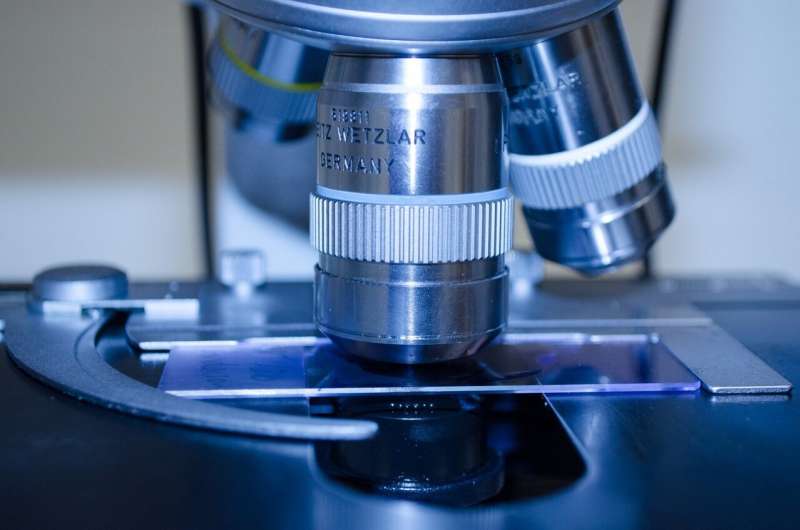This article has been reviewed according to Science X's editorial process and policies. Editors have highlighted the following attributes while ensuring the content's credibility:
fact-checked
trusted source
proofread
Investigational deep learning model may help stratify risk for patients with endometrial cancer

An investigational deep learning model requiring one histopathologic slide accurately predicted the risk of distant recurrence in patients with endometrial cancer, according to findings presented at the AACR Annual Meeting 2023, held April 14–19.
Endometrial cancer is the most common type of uterine cancer. While patients with early-stage uterine cancer have an approximately 95% five-year survival rate, those who develop a distant recurrence have a very poor survival outcome, according to Sarah Fremond, MSc, a Ph.D. candidate in computational pathology and deep learning for endometrial cancer at Leiden University Medical Center in the Netherlands.
The risk of distant recurrence may be reduced by adjuvant systemic therapy; therefore, correctly identifying patients at high risk and low risk of distant recurrence is crucial for personalized adjuvant treatment recommendations and for reducing unnecessary morbidity from toxic treatments, she explained.
Current methods of risk stratification, which rely on pathologists assessing histopathologic images, are limited by significant variability between pathologists. While molecular testing of tumor tissue is of additional value, this method comes with high costs and the need for complex infrastructure. Fremond added that the increasing number of prognostic variables has made it difficult to combine the relevant factors into a single risk score.
To overcome these challenges, Fremond and colleagues examined the potential of deep learning (a form of artificial intelligence) to predict patients' risk of distant recurrence using digitized histopathological slides. The study was a collaborative effort by the AIRMEC Consortium, which involved the Department of Pathology at Leiden University Medical Center, the TransPORTEC Consortium, and the Department of Pathology and Molecular Pathology at the University of Zurich.
"Deep learning is a powerful computer-aided predictive technology that has entered the field of pathology because it can be trained to read complex visual information from tumor slides after digitization," Fremond said. "In this study, we aimed to evaluate whether a deep learning model could be trained to predict risk of distant recurrence in patients with endometrial cancer using routine histopathological slides as a cost-effective input."
To develop the model, Fremond and colleagues utilized long-term follow-up data from patients enrolled in the PORTEC-1/-2/-3 randomized clinical trials and patients in three separate clinical cohorts, amounting to 1,761 patients with endometrial cancer who had not received prior adjuvant chemotherapy.
One representative histopathological slide image of the tumor was used from each of 1,408 patients to train and optimize the model. "This means that the model was exposed many times to the histopathological image and to the information regarding the time to distant recurrence in each patient until the model started to recognize visual features that were predictive of distant recurrence," Fremond explained.
To assess its performance and generalizability, the resulting model was then tested on the previously unseen dataset of 353 patients whose data were not used to train the model. The model identified 89 of these patients as having a low risk of distant recurrence, 175 an intermediate risk, and 89 a high risk. These predictions were consistent with the patients' outcomes: 3.37% of patients categorized as low-risk experienced a distant recurrence, as compared with 15.43% and 36% of those categorized as intermediate-risk and high-risk, respectively.
Fremond noted that the results outperformed pathologist-identified features, such as tumor type, grade, and molecular class, typically used to assign risk groups. "We are currently working on improving performance by integrating clinical variables that cannot be read in the histopathologic slides," she added.
"This deep learning model is capable of predicting the risk of distant recurrence for patients with endometrial cancer using one digitized histopathological slide as a cost-effective input," said Fremond.
"Although additional external validation is needed, the performance of this model serves as an important proof of concept that deep learning models have the potential to optimize clinical care for patients with endometrial cancer," she said.
Limitations of the study include its retrospective design and the lack of large-scale external validation to assess the generalizability of the model across different populations. Additionally, it is currently unclear how differences in tissue scanning and slide preparation protocols might impact the performance of the model.

















